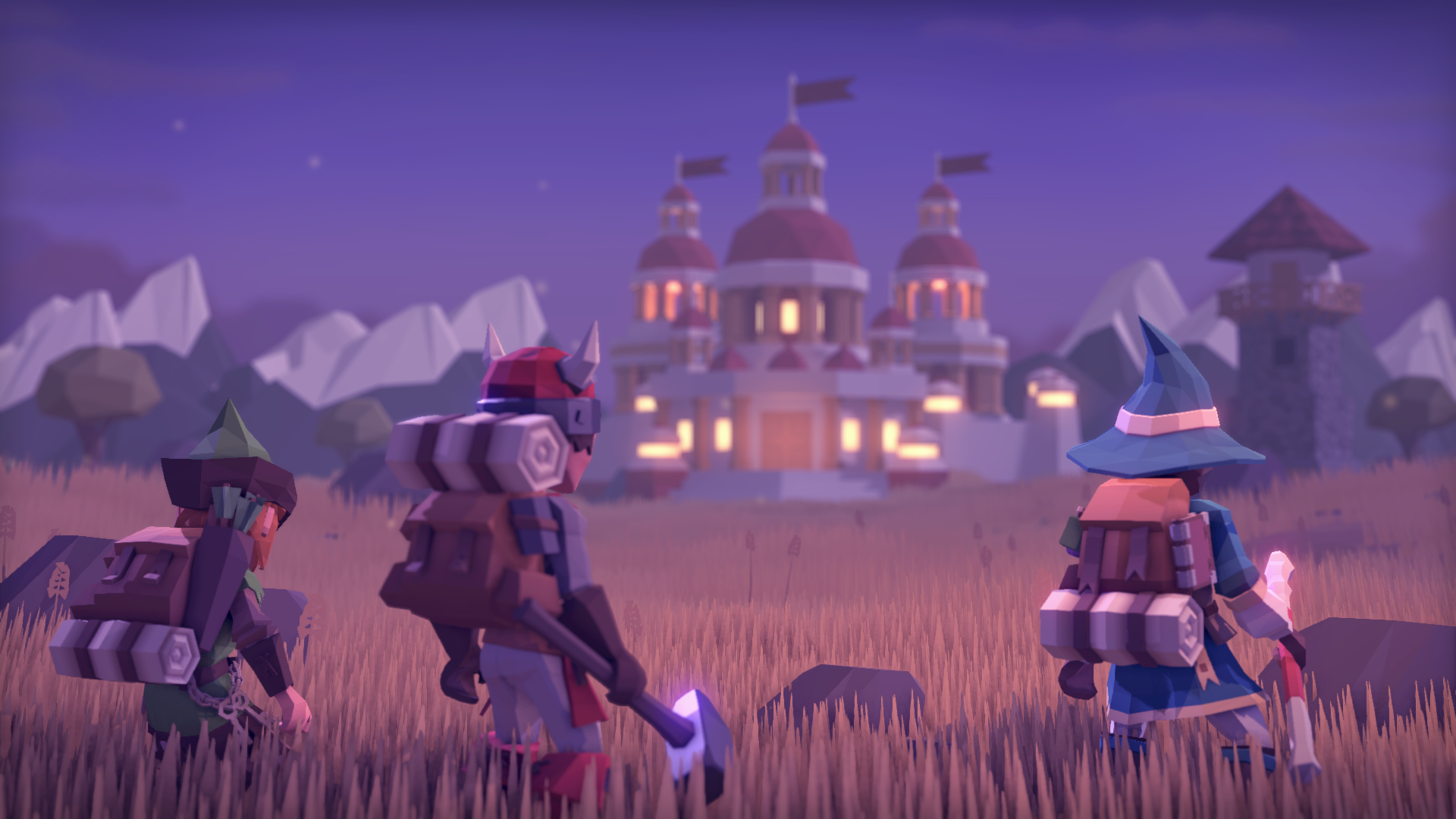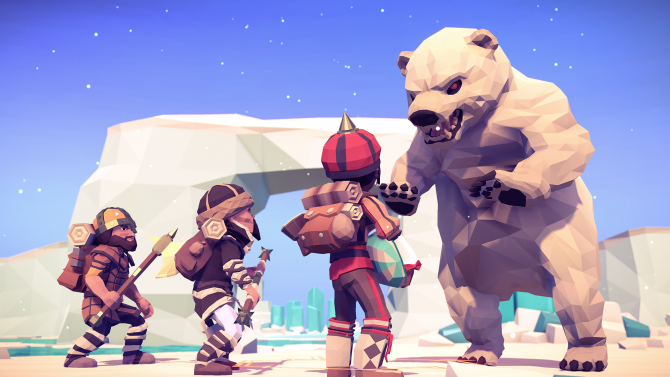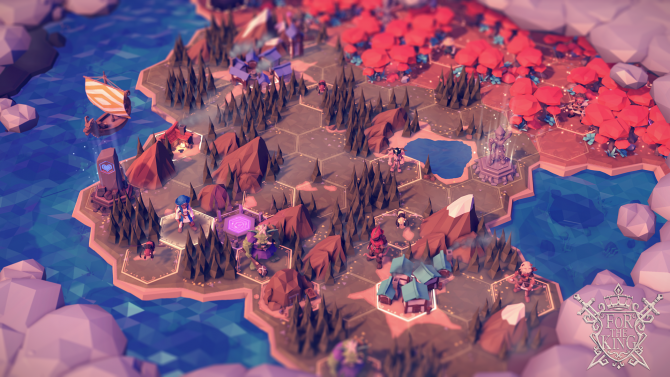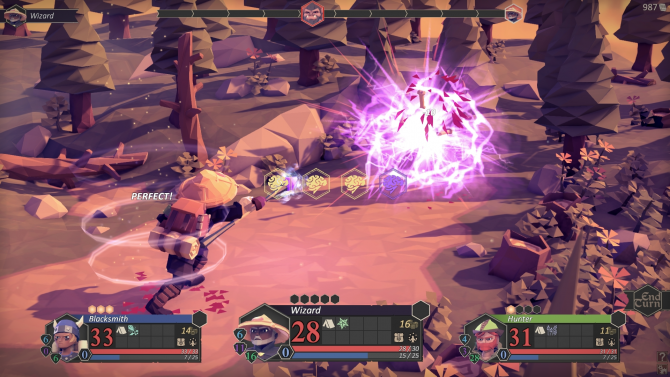While the roguelike is undoubtedly a crowded genre in the indie scene, I also find it to be one of the most interesting. Having to restart from scratch after a game over is not just punishing, but encourages players to be more methodical in their action and forces developers to be more creative in design to adapt to this deliberate design decision. For the King from IronOak Games and Curve Digital attempts to stand out from other roguelikes with its unique blend of tabletop inspired RPG gameplay and engaging multiplayer.
While some of that early-game roguelike frustration is present here in full force, For the King is a memorable and fun title that both fans of roguelikes and standard turn-based RPGs should have a good time with. The game may be a bit rough around the edges with some glitches and frustrating RNG, but if those things improve post-launch, For the King keeps pulling me back in, and is poised to become a staple roguelike for me.
[pullquote]"For the King is a memorable and fun title that both fans of roguelikes and standard turn-based RPGs should have a good time with."[/pullquote]
Roguelikes are typically tough, and For the King is no different. While many of its story beats and gameplay mechanics are familiar, For the King is quick to punish you if you don't play smart. Players are even reminded of this, but still encouraged, with the following message as soon as they boot up the game:
"Do not set out on this quest with the expectation that you will succeed at first try. Your betters have gone before you, and fallen to the last. Yet do set out, and strive. Learn what you can. And when you fall and your light is extinguished forever, despair not, for many more answer the call each day."
In For the King, players can test their skills in three different campaigns, all of which are enjoyable in their own right. The first is The Brink of Chaos, which has players pursuing the evil wizard Vexor for killing King Bonner, ultimately plunging Fahrul into chaos. This is the initial campaign that was available from the game's Early Access launch, and thus is the most fleshed out. Next up is Dungeon Crawl, a more gameplay-focused free-form mode where players must clear five dungeons.
The third campaign, which was not available in Early Access, is The Treasure of Frostbit Peak. This campaign has players searching for a valuable treasure located on the frosted-over, titular mountain. These three campaigns do differ profoundly in plot, though I wouldn't say any of them are particularly engaging: they serve as more of a means to an end. That being said, gameplay stays consistent between the three, and it should be quite satisfying to those familiar with tabletop RPGs.
At the beginning of each game, one's customizable party of three starts at level 0, with mediocre weapons and pitiful defenses. For the King's campaigns take place on hexagonal gridded overworld that is populated with quest objectives, enemies, towns, and unique events. To move a character, players must digitally "roll" for movement points, which are based on said characters speed. This is the tip of the iceberg for the tabletop mechanics, as every action your party takes is tested by one of the core stats.
A timeline at the top of the screen shows both turn order and the level of chaos in Fahrul. To keep chaos quelled, players must complete objectives or interact with unique encounters in the overworld, which keeps things fast-paced and enjoyably stressful. Before long, the game pushes you into combat to level up your weak characters. For the King's combat is pretty standard turn-based RPG fare at its core, with players choosing from a set number of attacks and abilities granted by their class and weapon, hoping they get a good roll in order to inflict maximum damage.
There are also various buffs and debuffs for players to look out for alongside enemies with special weaknesses and immunities. If you want to guarantee a roll, whether it be in the overworld or in combat, you can use a limited number of Focus points to do so. This creates a fun risk/reward system as players have to decide when the right time to use Focus is. Using it too early or on a failed event may hinder you later on, and even prove deadly. This is especially prevalent in dungeons, which provide a gauntlet of enemies and traps for players and have minimal downtime. It's in these caves that most runs will end.
[pullquote]"...For the King isn't hesitant to punish players for dumb moves or unlucky rolls...."[/pullquote]
As I have mentioned before, For the King isn't hesitant to punish players for dumb moves or unlucky rolls either, even on the easiest difficulty. It's entirely possible to get a great weapon from a random event in the overworld only to lose soon after in a dungeon because you miss multiple times in a row when an enemy continues to hit you for massive damage. While this is pretty common within the roguelike genre, especially when these aspects are randomized, they are super prevalent in the For the King's early game, which may turn off new players at first.
Fortunately, the more you play, the more lore you collect from various chests and events. This lore can then be redeemed on the main menu in order to unlock things like new characters, special events, and weapons for future runs. While dying early on over and over can be very annoying in For the King, this lore system did entice me to keep hopping back in because I knew things would play out slightly differently the next time through. For the King's solid roguelike setup is bolstered even more by the fact that you can play with friends, both locally and online.
While its community is a bit small, those who participate are consistently active and friendly. The game's turn-based system allows online play to run smoothly, and while its smart to never stray too far away from each other, having some actions out of your control in a game like this can make things all the more engaging. I hope the game's community will healthy after launch, because For the King's multiplayer feature is one of the leading elements that helps it stand out from other roguelikes, and the game may lose a bit of its distinct identity if the community dies out.
When it comes to the technical side of things, For the King isn't as smooth as its low-poly graphics. The game has actively been in Early Access for over a year, and while the developers do seem to be working diligently to fix them, I still ran into some game-breaking ones. I had save files corrupted on more than one occasion, with them just leading me to a black screen. The menus would occasionally not load right, and the enemies would sometime ragdoll oddly if killed in the "right' way. While I do not doubt that IronOak Games will iron out these bugs post-launch, early adopters should still keep them in mind.
[pullquote]"[For the King] is saved by its fun tabletop RPG inspired mechanics and multiplayer capabilities, which help it stand out in a sea of roguelikes."[/pullquote]
Fortunately, For the King is incredibly clean and consistent when it comes to visuals and sound. Even though the game features a low-poly artstyle, environments and enemies are still surprisingly detailed. The game's soundtrack is also very memorable, jumping between more soothing and intense tracks when needed excellently. While For the King isn't stable at times, what you are experiencing when things are running smoothly is very pleasant.
As an indie title straight out of Early Access, For the King isn't without a few rough spots, especially when it comes to the technical side of things. Luckily, the game is saved by its fun tabletop RPG inspired mechanics and multiplayer capabilities, which help it stand out in a sea of roguelikes. As a fan of the genre, I can see myself consistently returning to For the King, and think other roguelike fans and people who enjoy tabletop RPGs will find something to enjoy here.




